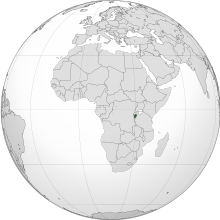
Back Бурунди Abkhazian Burundi ACE Burundi Afrikaans Burundi ALS ቡሩንዲ Amharic Burundi AMI Burundi AN Burundi ANG Burundi ANN بوروندي Arabic
Republic of Burundi | |
|---|---|
Motto:
| |
| Anthem: Burundi Bwacu (Kirundi) Our Burundi | |
| Capital | Gitega (political)
Bujumbura (economic)[a] 3°30′S 30°00′E / 3.500°S 30.000°E |
| Largest city | Bujumbura[a] |
| Official languages | Kirundi & Swahili (national and official) French (official) English (official)[1][2][3][4] |
| Ethnic groups ([5]) | |
| Religion (2015)[6] |
|
| Demonym(s) | Burundian |
| Government | Unitary dominant-party presidential constitutional republic |
| Évariste Ndayishimiye | |
| Gervais Ndirakobuca | |
| Prosper Bazombanza | |
| Legislature | Parliament |
| Senate | |
| National Assembly | |
| Status | |
| 1945–1962 | |
• Independence from Belgium | 1 July 1962 |
• Republic | 28 November 1966 |
| 28 February 2005 | |
| Area | |
• Total | 27,834 km2 (10,747 sq mi)[7] (142nd) |
• Water (%) | 10[8] |
| Population | |
• 2020 estimate | 11,865,821[9] (84th) |
• 2008 census | 8,053,574[7] |
• Density | 401.6/km2 (1,040.1/sq mi) (20th) |
| GDP (PPP) | 2019 estimate |
• Total | $8.380 billion |
• Per capita | $727[10] |
| GDP (nominal) | 2019 estimate |
• Total | $3.573 billion |
• Per capita | $310[10] |
| Gini (2013) | 39.2[11] medium |
| HDI (2018) | low · 185th |
| Currency | Burundian franc (FBu) (BIF) |
| Time zone | UTC+2 (CAT) |
| Date format | dd/mm/yyyy |
| Driving side | right |
| Calling code | +257 |
| ISO 3166 code | BI |
| Internet TLD | .bi |
Burundi (officially called the Republic of Burundi) is a small country in Africa. The capital of Burundi is Gitega. The official languages of Burundi are Kirundi, French and English. There are about eight and a half million people in Burundi. Burundi is one of the poorest countries in the world.
Cite error: There are <ref group=lower-alpha> tags or {{efn}} templates on this page, but the references will not show without a {{reflist|group=lower-alpha}} template or {{notelist}} template (see the help page).
- ↑ "What Languages Are Spoken In Burundi?". August 2017. Archived from the original on 13 March 2018. Retrieved 12 March 2018.
- ↑ "English is now official language of Burundi". Archived from the original on 14 February 2018. Retrieved 12 March 2018.
- ↑ "Analyse et adoption du projet de loi portant Statut des Langues au Burundi - Assemblée Nationale du Burundi". Assemblée Nationale du Burundi. Archived from the original on 13 March 2018. Retrieved 12 March 2018.
- ↑ "The impact of English on Kirundi and French in Burundi: Use and attitudes among Burundian students" (PDF). Archived from the original (PDF) on 13 August 2017. Retrieved 12 March 2018.
- ↑ "The World Factbook – Burundi". Central Intelligence Agency. 7 August 2018. Archived from the original on 28 January 2018. Retrieved 13 August 2018.
- ↑ "Religions in Burundi | PEW-GRF". Archived from the original on 2017-12-04. Retrieved 2020-09-03.
- ↑ 7.0 7.1 "Quelques données pour le Burundi" (in French). ISTEEBU. Archived from the original on 28 July 2017. Retrieved 17 December 2015.
- ↑ Annuaire statistique du Burundi (PDF) (Report) (in French). ISTEEBU. July 2015. p. 105. Archived from the original (PDF) on 7 June 2016. Retrieved 17 December 2015.
- ↑ CIA – The World Factbook – Burundi Archived 28 January 2018 at the Wayback Machine CIA. Retrieved 8 June 2008.
- ↑ 10.0 10.1 "Report for Selected Countries and Subjects : Burundi". International Monetary Fund. Retrieved 20 February 2020.
- ↑ "Gini Index, World Bank Estimate". World Development Indicators. The World Bank. Archived from the original on 26 June 2015. Retrieved 13 January 2015.
- ↑ "Human Development Report 2019". United Nations Development Programme. 10 December 2019. Archived from the original (PDF) on 30 April 2020. Retrieved 10 December 2019.



